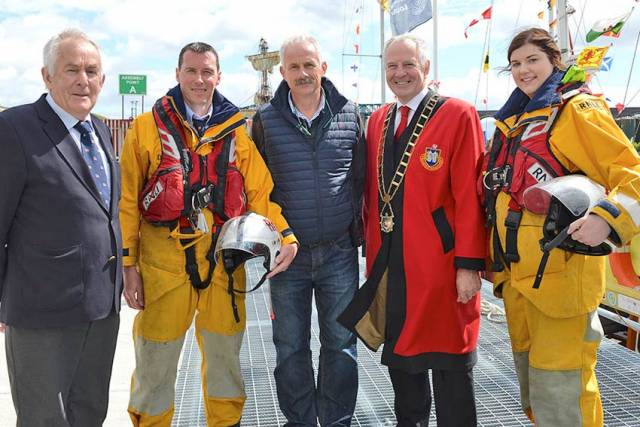#RNLI - Clogherhead RNLI in Co Louth officially launched the station’s €150,000 Shannon lifeboat appeal on the final day of the Drogheda maritime festival yesterday (Sunday 11 June).
The total cost of Clogherhead’s new Shannon class all-weather lifeboat will be in the region of €2.5 million, the majority of which will be provided through an Irish legacy.
However, the lifeboat station must raise €150,000 towards the cost of the project through a community appeal before the lifeboat is due to go on service in 2019.
The current Clogherhead lifeboat, Doris Bleasdale, is a Mersey class that can reach a top speed of 15 knots.
In the last five years, the lifeboat crew in Clogherhead have launched their lifeboat 58 times and brought 60 people to safety.
With a Shannon class lifeboat, designed by Derry man Peter Eyre, those launches will be even faster with its top speed of 25 knots, and improved range and manoeuvrability thanks to its waterjet propulsion, which also allows the vessel to operate in shallow waters and be intentionally beached.
The official launch took place in the presence of the Mayor of Drogheda Oliver Tully and the Drogheda Harbour Master Captain Martin Donnelly on the new pier for visiting yachts at Drogheda Port, which was itself launched at the weekend during the Irish Maritime Festival.
Speaking at the launch, Drogheda Mayor Oliver Tully paid tribute to the Clogherhead lifeboat crew.
“When we hear of the RNLI going to sea we think of Clogherhead and we think of the all the lives you have saved and your predecessors before you. I would like to thank you for the tremendous work that you do. It is the Clogherhead lifeboat but is supported by everyone in the surrounding area.”
The Mayor also hailed lifeboat mechanic Padraig Rath for keeping the current lifeboat in pristine condition for 24 years.
Coxswain Tomas Whelehan added: “We are delighted that this day is finally here and we can announce the news of a Shannon class lifeboat for the east coast. We have been overwhelmed with the goodwill of people and offers of support. This new lifeboat will represent everyone in our communities as well as those who visit our shores for work or pleasure.
“Our lifeboat crew launch in all conditions at any time of night or day to bring loved ones home. The least we can do is give them the very best in lifeboat technology. Not all callouts are rescues and sometimes there is tragedy but whatever the call, our crews are always ready to answer it and our lifeboat always ready to be launched.”
For further details of how to get involved with the Clogherhead RNLI Shannon project, contact the station at 041 982 2600 and follow the Facebook page for updates.
































































